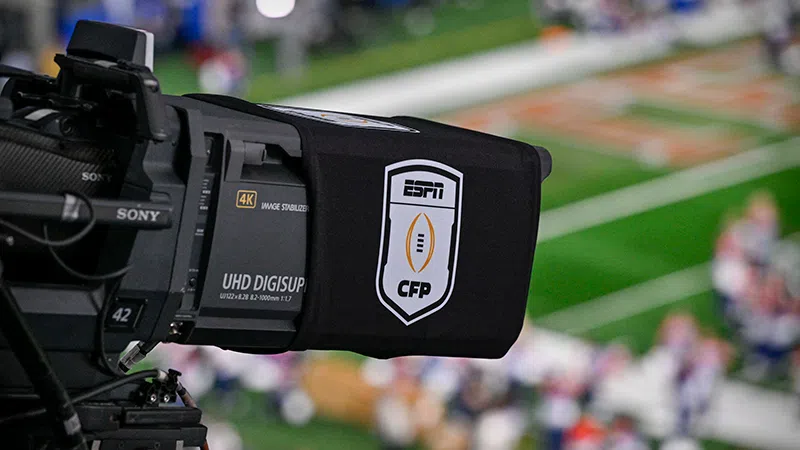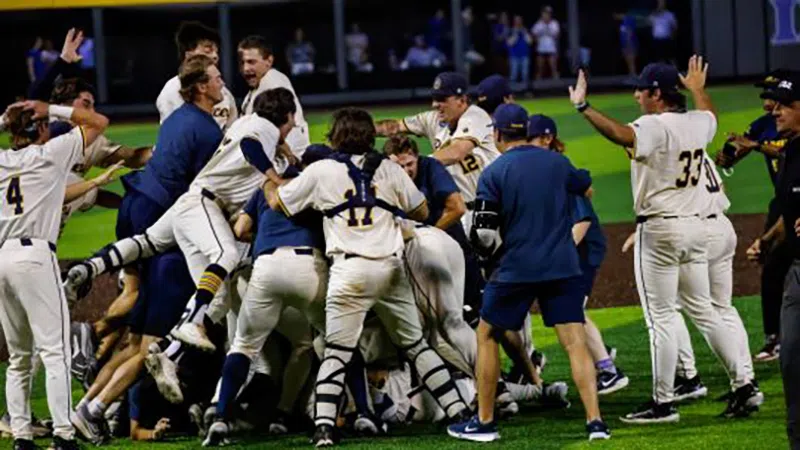
LSU’s biggest super regional advantage figured to be starting pitching.
Kade Anderson and Anthony Eyanson allowed 11 runs on the weekend, the most they’ve combined to allow in 17 weeks, and LSU still cruised to the College World Series.
The offense erupted for 28 runs. The bullpen threw six innings of three run baseball. The crowd was exceptional, and the Tigers dusted West Virginia in a pair of games to sweep the Super Regional.
Next stop: Omaha.
STARTING STRUGGLES
Let’s begin with those starters who just didn’t have their best stuff this weekend. Anderson was nails through the first five innings before LSU took a 10-1 lead.
He surrendered four hits and a walk in the sixth and homer in the seventh. The Mountaineers fought him for everything and only struck out once over the 13 hitters that came to the plate in the sixth and seventh. Anderson had six strikeouts in the first five innings.
Eyanson stuffed the first four hitters of Sunday’s game into a locker with his breaking ball, but almost nothing came easy after that. The next 20 hitters battled tooth and nail only striking out three times and creating seven base runners. Two of those seven swings were homers, bumping Eyanson’s season-long total of longballs surrendered from four to six.
Part of West Virginia’s offense is their ability to spoil pitches and put the ball in play. That was on display against both Tiger aces. As jarring as it was to see Eyanson allow more earned runs Sunday (4) than he did in his six previous appearances, his velocity held for all 104 pitches, and he’ll be on longer-than-normal rest assuming he pitches on Monday in the College World Series.
Liam Doyle of Tennessee struggled after working the Friday-to-Monday regional schedule. Landon Marceaux tried to do the same for LSU in 2021, and he only lasted three innings in Knoxville after double-duty in Eugene the week prior. Eyanson just wasn’t his best on Sunday. Anderson was visibly perturbed by his seven-inning effort on Saturday.
LSU will absolutely need more from its ace duo in Omaha, but the weekend wasn’t enough cause to pound the panic button.
MONSTER MASHING
Steven Milam produced multiple hits in six of 32 games against SEC competition. He did it three times in six regional/super regional games at The Box. None of it was cheap. His opposite field grand slam on Saturday may not have left the yard on every south Louisiana day. The wind helped, but it was driven hard to the opposite field. His two doubles on Sunday were absolutely melted.
I can’t swear to this, but I’m confident he’s the only .200 SEC hitter to hit third and fourth for LSU in a super regional. He’s found the mojo he had in Chapel Hill last year when he had seven hits including a pair of homers. He’s now driven in 12 runs in 11 career NCAA Tournament games.
Milam’s presence in the lineup is so vital to LSU. He’s a switch hitter with elite bat to ball skills and enough power to scare some teams. His grand slam on Saturday and three-run double on Sunday were the series shifters over the weekend.
GIVEAWAYS
West Virginia was extremely charitable over the weekend. The Mountaineers issued 17 walks, hit eight batters and made five errors. That number doesn’t include a dropped pop up on Sunday that plated a run. That’s 31 free bases in two days.
No one is going to win in Alex Box Stadium doing that. Interestingly, West Virginia got away with five errors in the regional final against Kentucky. They got burned Saturday and Sunday.
Arkansas doesn’t figure to be as in giving in Omaha.
HOME SWEET HOME
LSU finished the season 35-6 at Alex Box Stadium and never lost a home weekend. Since the new Alex Box Stadium opened in 2009, only the 2018 and 2025 Tigers have gone through regular and postseason play without losing a home weekend.
All season LSU has swung the bats better at home than on the road, and that was the case in the final home weekend. LSU had a five-run inning, two six-run innings and a seven spot to help put away the Mountaineers.
BACK ON TRACK
LSU’s bullpen is going to be crucial if the Tigers are going to make a run in Omaha. As great as Anderson and Eyanson are, they can’t pitch them all.
Mavrick Rizy, Cooper Williams and Chase Shores were brilliant over the weekend in their last pre-Omaha audition.
Rizy retired three of the four men he faced Saturday afternoon. He was up to 98 mph. Williams worked 6.1 innings of one-run baseball in the two home NCAA weekends. Twenty-two of his 33 pitches were for strikes on Sunday, but five of his last seven were balls. So, 17 of the first 26 were strikes including eight of his first nine when he entered. I like strikes. I like them more from the left side.
Williams has probably usurped the “first-lefty” role from DJ Primeaux and Conner Ware. Primeaux was first on Saturday, but what Williams has done is hard to ignore.
It’s not hyperbole to suggest Shores is the biggest variable on the roster for the College World Series. The guy who slammed the door on Sunday night can beat anyone. He was sitting at 100 mph, and West Virginia didn’t stand a chance. Then he snapped off that slider to Logan Sauve, and it was goodnight.
Still, this is the same guy who walked three and yielded four earned runs against Little Rock in one inning a week earlier. Jay Johnson is going to go to Shores in a big spot in Omaha. That’s a given, assuming the spot arises. How Shores throws the ball will likely dictate how far LSU advances. If it looks like Sunday night, the Tigers could hang around for a week.
SABINS SURRENDERS
I can’t help but believe Steve Sabins gave up on Saturday, and I think it was because of Anderson.
The score was 3-1 in the fifth, and Anderson had hung three straight zeros with five strikeouts. With a runner on, Sabins pulled starter Griffin Kirn. He did not go to his best bullpen arms, Chase Meyer or Reese Bassinger. Instead, he went to a freshman who had six total innings pitched on the season.
JJ Glasscock walked two hitters on nine pitches. Then Sabins went to another lightly used arm in Cole Fehrman. He didn’t get an out. Milam greeted him with a grand slam, and the next two hitters reached base via the free pass.
That 3-1 lead grew almost instantly to 10-1, and the game was over. If you could transpose Meyer’s four great innings of relief work from Sunday back to Saturday’s game, West Virginia’s nine runs on 11 hits start to look really good. Sabins didn’t believe his team could score on Anderson, so he saved his arms.
Anderson’s seven innings on Saturday weren’t excellent, but the body of work and respect he garners essentially won LSU the game on Saturday based on the bullpen decisions West Virginia made.











